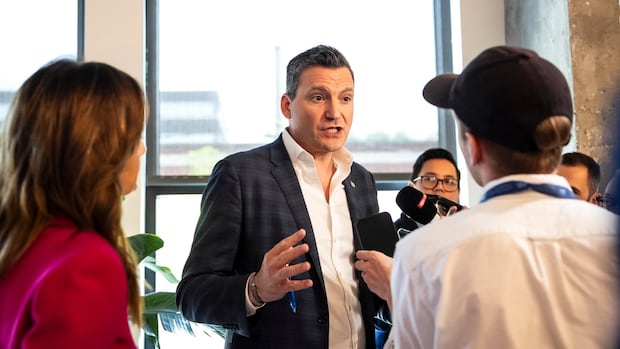Canada’s AI minister is closely following court cases in Canada and the U.S. to determine the next step in Ottawa’s approach to regulation of AI.
Some AI companies claim to have won early victories south of the border, and Openai is now fighting the jurisdiction of Ontario courts to hear lawsuits from news publishers.
Evan Solomon’s office said in a statement that he plans to “introduce copyright in Canada’s broader approach to AI regulation, with a focus on protecting cultural sovereignty and how (creators) can incorporate it into this conversation.”
But there is currently no plan for an independent copyright bill, as Solomon’s office “strickenly monitors ongoing court cases and market developments” to help map the way forward.
It is unclear how long it will take for these court cases to determine whether AI companies can use copyrighted content to train their AI products.
CBC/Radio-Canada, Postmedia, Metroland, The Toronto Star, The Globe and Mail and Canadian Press have launched a joint lawsuit against Chatgpt Creator Openai to use news content to train its Chatgpt Generative Matotericnity Intelloticent Intelloticence System. News agencies say Openai violates copyright by “scraping content” from its website.
The Union of Press Publishers launched the only case to raise questions late last year, and the Ontario High Court will hear the judicial challenge in September.
The alliance includes Canadian Media, Tolstall, Earth and Mail, Postmedia and CBC/CANADA – is suing OpenAI to use news content to train its generated artificial intelligence systems.
News publishers believe Openai violates copyright by scraping a large amount of content from Canadian media and then profiting from using it without permission or compensation.
They said in court documents that Openai “engages ongoing, intentional and unauthorized misappropriation of (its) valuable news media works.”
“Rather than seeking legal access to information, Openai chose the valuable intellectual property of a news media company and converted it into its own use, including commercial use, without consent or consideration, without consent or consideration.”
Openai has challenging jurisdiction
Openai denied the allegations, after saying its model was trained in publicly available data and “based on fair use and related international copyright principles.”
The company, based in San Francisco, is challenging the Ontario court jurisdiction to seek trial of the case.
It stated in court documents that it is not in Ontario, nor does it operate in the province.
The New York Times is suing Openai and Microsoft for using millions of newspaper articles without permission to help train artificial intelligence technology.
Openai also believes that the Copyright Act does not apply outside Canada.
Openai asked the court to seal some documents in this case. According to the timeline outlined in the court documents, the court plans to hold a hearing on the sealing motion on July 30.
It requires the court to seal documents containing “business-sensitive” information, including documents about the organization and structure of its companies, its web crawling and acquisition processes and systems, and its “model training and reasoning processes, systems, resource allocation and/or cost structures.”
“The AI industry is highly competitive and is growing rapidly,” the affidavit submitted by the company said. “The industry has many competitors, ranging from large technology companies such as Google and Amazon to smaller startups seeking a foothold in the industry.
“As a recognized leader in the AI industry, the defendant’s competitors and potential competitors will benefit from obtaining the defendant’s confidential information.”
The lawyers of the press publisher provided information about the court deadline but did not comment on the case.
Many lawsuits are underway in the U.S. involving AI systems and copyrights, some dating back to 2023. In late June, AI companies won in two of these cases.
In a case initiated by a group of authors, including comedian Sarah Silverman, the judge ruled that AI Systems’ use of published works was justified and the author did not prove that its use would lead to market dilution.

But the judge also said his ruling would only affect those specific authors (the lawyers did not make the right argument) and did not mean that Mehta was legal to use copyrighted materials to train his system. Judge Vince Chhabria stated in his summary judgment that “the consequences of this ruling are limited in the grand plan of things”.
In another U.S. case, the judge ruled that AI companies were fairly used in unauthorized training of their systems. But Judge William Alsup also ruled that personification “has no right to use pirated copies.”
Jane Ginsburg, a law school professor who studies intellectual property and technology, said it would be too simple to regard these cases as a complete victory for AI companies.
“I think in other cases the issue of giving the pirates of origin and the issue of market dilution will be big issues.”

